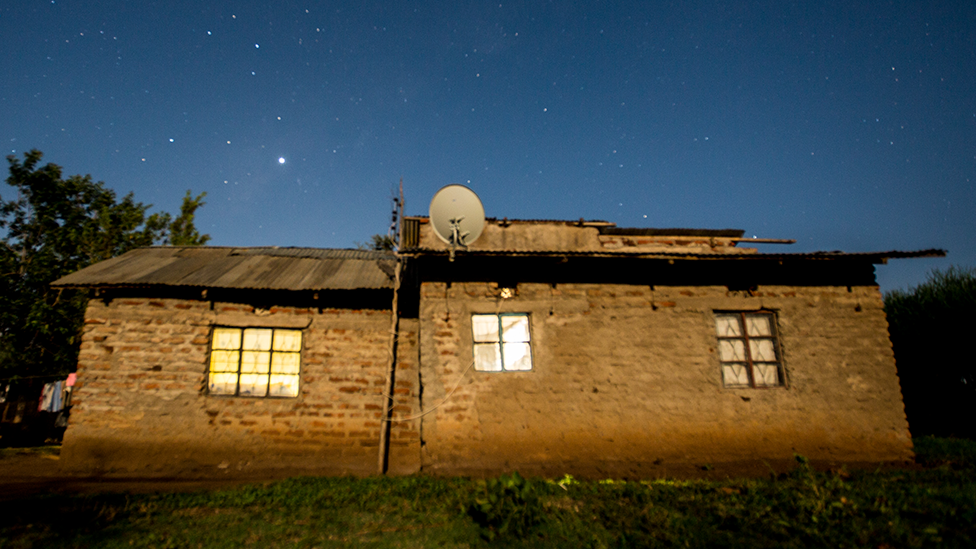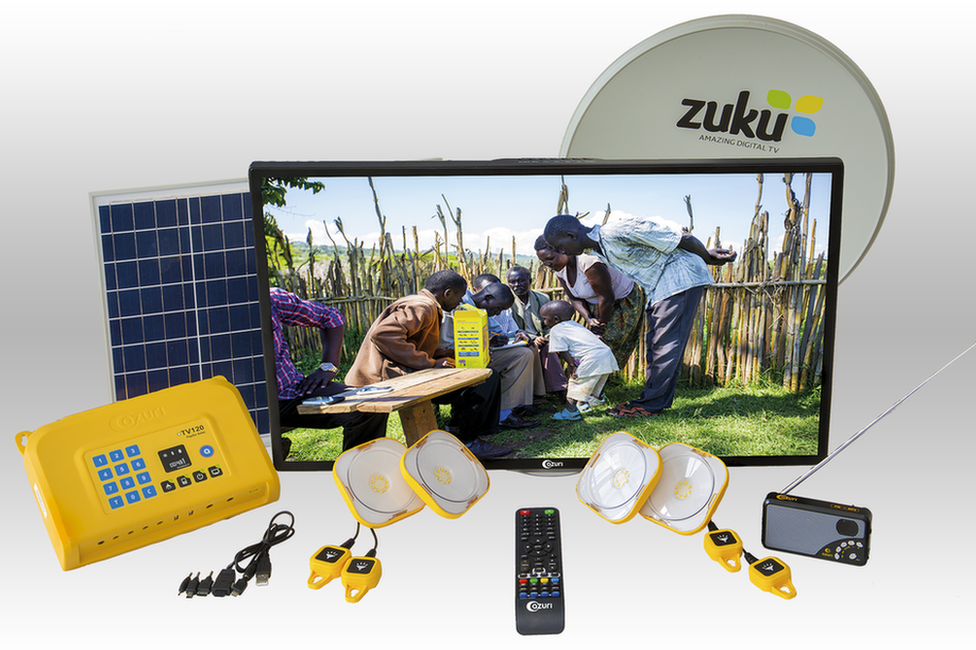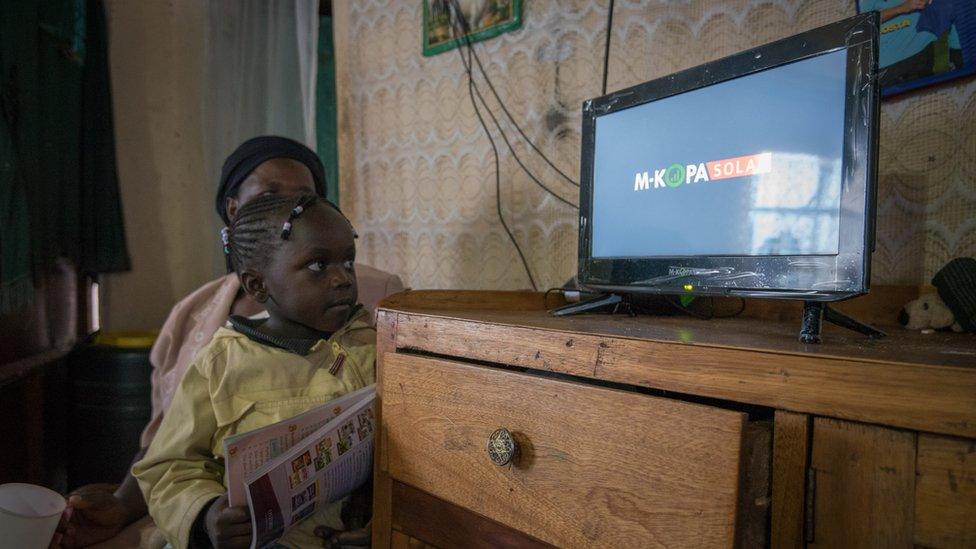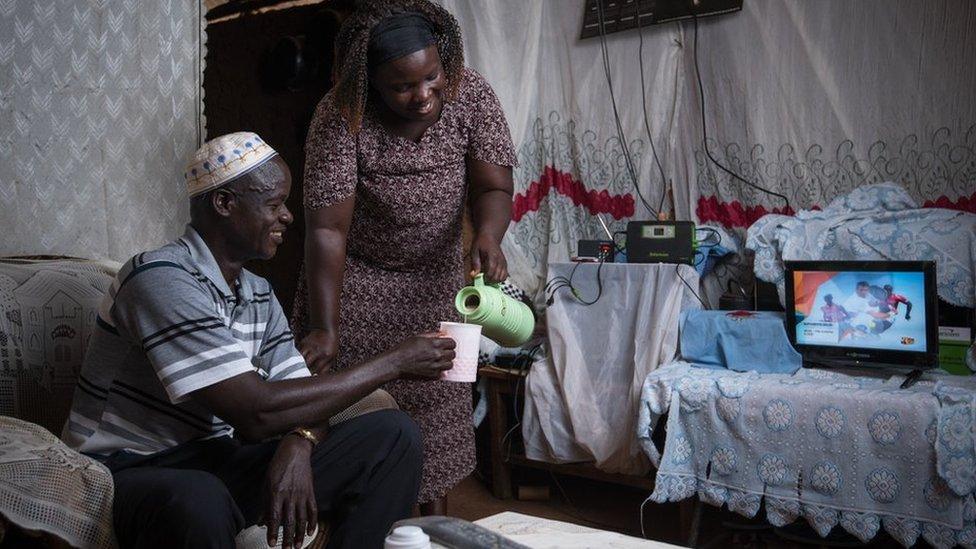TV from the sun: 'Now I am connected to the whole world'
- Published

The sun is now bringing power to hundreds of thousands of off-grid households in Africa
Stanley Gikonyo says his life has been transformed by satellite TV. "I am connected to the whole world," he says.
But what's extraordinary is that his house, where he lives with his wife and two children in Mwea, central Kenya, has no access to mains electricity.
Instead, the power for Mr Gikonyo's new TV service comes directly from the sun. He is one of the early adopters of AzuriTV - a new solar-powered satellite TV service that gives his family access to 50 channels.
He says the system is already making his life easier, and has opened new doors for his farming business.
"I had been using other solar panels and normal batteries, which gave me a hell of a time in charging them, and with acid spills," he says.
"The AzuriTV has for sure done me good - I can now watch my favourite stations. In particular, I watch Shamba Shape Up, which gives a lot of insights into the best farming practices.

Off-grid Kenyan households can now watch satellite TV at night, powered by daytime sun
"I am connected to the whole world."
Mr Gikonyo runs a small farm, or shamba, producing mostly vegetables and poultry, and he was one of the estimated 69% of Kenya's adult population that does not have daily access to television.
Off-grid, power on
UK-based solar company Azuri Technologies and Kenyan satellite TV provider Zuku launched the service in Kenya in December.
A solar panel is fixed to the roof of a customer's home, and connects to a battery which powers a range of appliances, including lamps, a mobile phone charger, and a 24-inch (61cm) TV which accesses Zuku's Smart satellite TV service.
Users pay an upfront fee of 4,999 Kenyan shillings (£39) for the system, and thereafter pay 149 shillings(£1.15) per day. By the end of two years on this payment schedule, customers own the kit outright.
While solar power products have been available in Kenya for several years, and some free-to-air terrestrial TV stations have been accessible in rural areas, this is the first time off-grid households have had access to a full range of satellite pay-TV channels.

Householders receive a kit that includes solar panel, battery, satellite dish, TV, radio and lights
All powered by the sun.
Missionary teacher Zacharia Maundu, who lives with his wife and two children in Kenya's Embu county, says: "My experience with AzuriTV is fantastic. Through it I am no longer cut off from information and entertainment.
"Watching the news has made us updated with the world's happenings."
AzuriTV provides lighting in their home, including a security night light, as well as access to world news and entertainment.
"Azuri aims to go beyond lighting and to provide each customer with TVs, internet access, entertainment and a range of services," says Azuri Technologies boss Simon Bransfield-Garth.
Rising sun
But he's not the only one to recognise this demand.
M-Kopa Solar has been providing pay-as-you-go solar power in East Africa for the past five years. About 500,000 households across the region use the company's products, and 10 months ago, the firm added 30 free-to-air TV channels to its offering.
"It was very demand driven," says Jesse Moore, M-Kopa Solar's chief executive. "TV has always been something people aspire to having in their homes."

M-Kopa Solar has also added TV to its suite of solar-powered services
He envisages solar powering an increasing number of home appliances, with refrigeration and air conditioning supplementing lighting, TV and internet.
And last year, tech company Cello Electronics developed a solar-powered 22-inch (56cm) TV designed to service the 1.2 billion people in the world without access to a reliable electricity supply.
Its smart antenna picks up high definition broadcasts and also has a built-in satellite tuner, while the solar panel and battery can provide up to 10 hours of operation on a single charge, the company says.
Realising that the $300 cost might be prohibitive for many poorer regions, Cello has introduced its own pay-as-you-watch scheme whereby householders only pay for the amount of TV they watch.
They can buy unlock codes through the remote control handset.
Competition
Danson Njue, research analyst at Ovum, says that while solar-powered satellite TV is a substantial addition to the services previously available to rural and off-grid consumers, its popularity will attract more competitors in to the market.
"The service may face some challenges, such as price competition from other service providers, as well as increased rural electrification under the government-led last mile connectivity project," says Mr Njue.

Solar TV services are in high demand, suppliers say
"In my opinion, increased electrification may see some households switch to other services that use normal grid power as opposed to solar."
But connecting people to mains electricity is expensive.
The Africa Progress Panel, chaired by former UN secretary-general Kofi Annan, estimates that investment in electricity infrastructure would need to rise to $55bn (£44bn) a year across the continent, compared to the $8bn a year currently being spent.
M-Kopa Solar's Mr Moore concedes that traditional infrastructure roll-out could pose a threat to solar power, but he believes it is the add-on services, like TV, that that will encourage rural populations to "leapfrog" traditional infrastructure and embrace sustainable power.
"If all we could achieve was lighting, any rational customer would hope the grid will come to them," says Mr Moore.
"But as we add more services, we hope customers will ask 'why would I connect to the grid?' Adding grid power is more expensive, less reliable, and doesn't offer relevant payment models.
"We think ultimately rural Africa will leapfrog the grid, and have access to all sorts of services."

Follow Technology of Business editor Matthew Wall on Twitter, external and Facebook, external